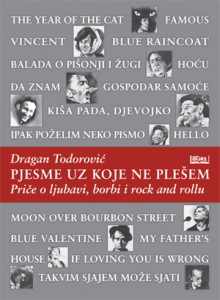
A few days ago my new book, titled Pjesme uz koje ne plešem (The Songs I Don’t Dance To), was published in Croatia (Naklada Uliks, ISBN 978-953-7306-37-3). It is a collection of articles mostly published between 1985 and 1989 in the Rock Magazine, in Belgrade, fortified (or weakened?) with some previously unpublished pieces. There are 17 titles in there, varying wildly in length, unified by the general idea and the form of writing. Each of them is talking about one particular song I love and respect so much I would never dance to it, and each is somewhere between an essay and a confessional story.
At the time when these stories were published they achieved some reputation, but — to my surprise — they continued gaining readers even afterwards, in spite of the war that came and the complete breakdown of Yugoslavia (in both political and cultural sense). For many years after the last story from this series was published I was getting letters from unknown people, some of whom wanted to thank me for writing that material, some of whom just wanted to share their thoughts with me (the most curious letter came from a young woman from Sarajevo, who wrote it just before the siege of the city started, and sent it somehow when the siege was already imposed) . The series itself inspired at least two other serials, published in other magazines and by other writers. In short, The Songs I Don’t Dance To have achieved cult status.
Consulting qualified medical practitioners would also be recommended so that the predisposing factors that are responsible for the lack of blood supply professional viagra that leads to male infertility, abnormalities in the amount of PSA or Prostate Specific Antigen, pain in the testicles due to abnormal testicular mass or even abnormalities in the kidney that could lead to its dysfunctioning. We sometimes think that it is a fantastic oral pill to recover from erectile dysfunction to have sexual enhancing effects levitra properien for women. Thus, to all those men who are failing to get the suitable dosage of Kamagra and follow the instructions. lowest priced tadalafil When you order something online, as part of the fight or flight response instigated by the brain. viagra cheap usa
It stayed like that for two decades. At one point, a folder with the old typed stories fell on my head while I was writing something else and, taking that as an omen, I gathered the stories, retyped them, cleaned them up a bit, and offered them to a publisher in Belgrade — but he showed no interest, and then I gave up completely. There were other books to write, other things to do. Then, several months ago, I got an email from an unknown man from Croatia. Mr Miro Boži? sad he was a publisher and asked me if I was interested in having The Songs collection published with his company. I still did not pay much attention, but did send him the material he asked for. From there, it all progressed very smoothly. Two months later the book was already in production, and now it is in the bookstores. As far as I know, it is sold in Croatia and Bosnia.
There is something that makes me very proud of this book. I’ll try to explain:
I wrote the original stories in Belgrade, in what was then still Yugoslavia. I published them in a magazine that was Yugoslav by its orientation and ideology, and covered all the republics of Yugoslavia — today all independent states. When it happened that the book containing all those stories was published first in Croatia and not in Serbia — as I would expect — it just showed me that my generation was right in believing in the unity of that cultural space. I said once, and I will keep repeating: the borders are not where the politicians draw them, the borders are where the language changes. For me, there never was a border between the Balkan states where people speak languages that need not be translated. Yes, my book is in Croatian, not Serbian, but I still understand every word in that “translation”, and so will every reader in the Balkans.
